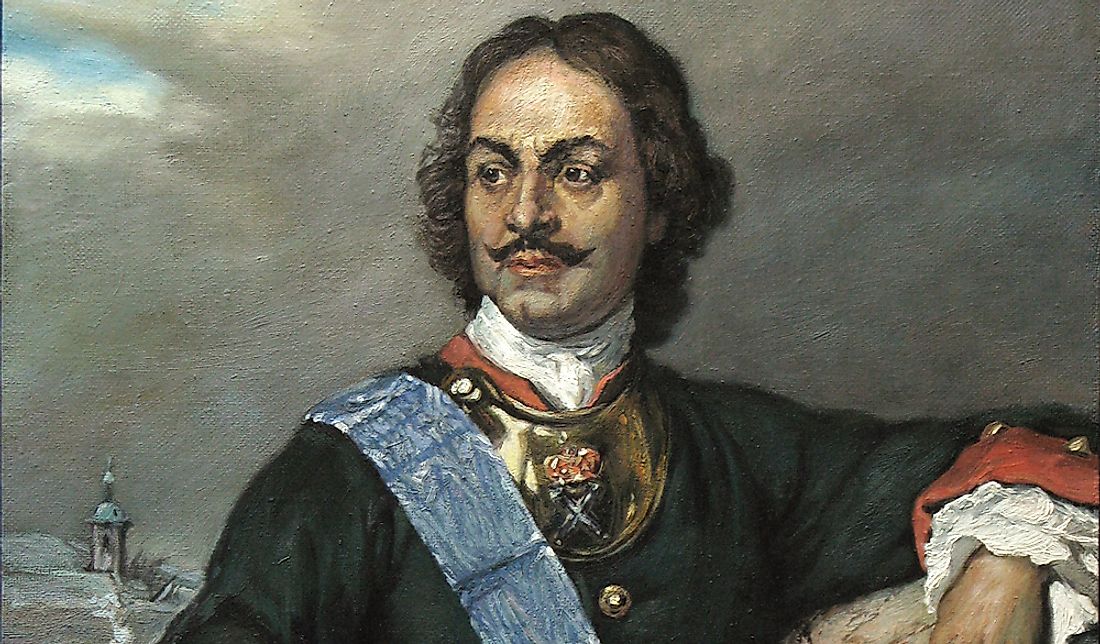Peter the Great - World Leaders in History

5. Early Life
Peter the Great, as he would later become known while a Russian Tsar, was born in Moscow, Russia on the 30th May, 1672, to Tsar Aleksey I and his second wife. Unlike his sickly siblings from the Tsar’s first wife, Peter was an inquisitive and energetic child who enjoyed outdoor games. As a young boy, he was interested in warfare, carpentry, sailing, and building ships. Peter was a keen learner, and received his early education from palace tutors, as well as at "German Town" within Moscow. His favorite subjects were mathematics and navigation. At the German town, he also focused his interests in new developments in science, technology, and natural science.
4. Rise to Power
Tsar Aleksey I died when the young Peter was only 4 years old. His heir was Peter’s eldest half brother, Fyodor III, who was sickly himself and died six years later. When Peter the Great was selected by the Orthodox Church council as heir, his half-sister, Sophia, and other relatives conspired with Streltsy Guards to install Ivan, Sofia’s brother, as Fyodor III's heir. A violent uprising ensued, and led to the slaughter of some of Peter’s relatives. A deal was arrived at wherein Peter and Ivan would share the throne with Ivan being the senior partner, and Sophia acting as a regent. Fearing for his safety, Peter and his mother relocated to Preobrazhenskoe Village outside of Moscow. Since Ivan was mentally challenged and sickly, Sofia ruled with Ivan’s position being largely ceremonial. Political temperatures changed in 1689, and the Streltsky revolted against Sophia and backed Peter, and Ivan agreed to support Peter himself as well. They served as co-rulers until January 29, 1696, when Ivan died, and Peter then became the singular, undisputed Tsar. Sophia, who by now had retired to a convent, died in 1704.
3. Contributions
In 1699, Tsar Peter reorganized Russia’s standing army into a more reputable and modern global force, and invested heavily in its soldiers' training. Before, this army was only mobilized as needed, comprised by villagers with modest military experience. He also built the first Russian navy, and with it scored key military victories. Peter's many military reforms allowed him to conquer more territories as he continued to expand Russia’s size. On May 27, 1703, he founded the city of St. Petersburg after capturing the Swedish fortress of Nyenskans. Tsar Peter also reformed the Russian tax system and introduced the poll tax, part of a series of measures that would increase government revenues by 600% between 1680 and 1724. In keeping with his reformation of his empire into a recognized European power, he also transformed his state officially from the Tsardom of Russia, a denomination introduced by Ivan the Terrible, to the Russian Empire.
2. Challenges
During his rule, Tsar Peter was also noted as often violent, tyrannical, and drunk. Revolts arose from citizens repulsed by the high taxes imposed upon them to fund reforms. Tsar Peter’s relationship with his eldest son was strained, as he hated his father’s reforms. Peter's son was charged with treason and died in jail from torture before his execution was carried out. While still ruling, Tsar Peter’s health began deteriorating when, in the Autumn of 1724, he plunged into icy waters to save some of his soldiers who were drowning in the Gulf of Finland. The illness took a toll on him, though he continued working and ruling until his death.
1. Death and Legacy
On February 8th, 1725, Peter the Great died at the Russian Winter Palace. Though during Peter's youth the European powers considered Russia as a backward country, during his reign it emerged as a continental and global power, hence his moniker as "Tsar reformer". The Russian state, economy, military, and culture alike were rejuvenated under his reign. Schools of medicine, engineering, science and navigation, and mathematics were founded, and Russia’s first state newspaper, the Vedomosti, was started during Tsar Peter’s reign. He also founded the city of St. Petersburg, building the city as Russia’s capital incorporating Western styles, and shifted Russian culture more closely towards that of Western Europe. He also founded the modern Russian imperial state breaking from the Tsardom preceding it, which remained in place until the Bolshevik revolution under Vladimir Lenin in 1917. Critics, however, argue that too much of this foreign influence significantly eroded Russia’s own ancient culture.







